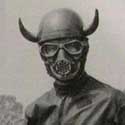|
Obdicut posted:Why on earth would you think that it's ignored in the academic world? And the 'mainstream media' generally acknowledges the other groups too. I can understand why. General knowledge on the holocaust is "Hitler/the Nazis tried to exterminate the Jews" and the number killed in the holocaust that gets frequently tossed around is 6 million, when that's the number of Jews only, and the Nazis killed almost an equal number of other ethnic/racial minorities and other "undesirables." Hell, looking back at my K-12 education I don't think there was a single mention of anyone other than Jews being killed by the Nazis in social studies/history until high school.
|
|
|
|

|
| # ? Apr 25, 2024 15:10 |
|
If you want to actually see what concentration camps were like, see this film: https://www.youtube.com/watch?v=T2rXhWeMzTo produced by Alfred Hitchcock for the BBC/British Military but never released. IT IS EXTREMELY GRAPHIC! BE WARNED! I've been in classes where this has been shown and students have vomited.
|
|
|
|
Dopilsya posted:If nobody minds, I'm not near the expert that the OP is, but I know a little about the situation and thought I might chime in: I don't get how there are SS men still alive and admit who they were. Aren't there organizations that hunt these guys like dogs? What do they do with themselves after the war? Who wants to hire an SS guy?
|
|
|
|
Uberskooper posted:I don't get how there are SS men still alive and admit who they were. Aren't there organizations that hunt these guys like dogs? What do they do with themselves after the war? Who wants to hire an SS guy?
|
|
|
|
Uberskooper posted:I don't get how there are SS men still alive and admit who they were. Aren't there organizations that hunt these guys like dogs? What do they do with themselves after the war? Who wants to hire an SS guy? No. Only a small number of SS are considered war criminals and actively sought. The rank-and-file SS member is not about to arrested. The SS did a couple things after the war. After they realized everything was falling apart, they took efforts to destroy any evidence that they had been in the SS - burning off their blood type tattoos (a tattoo in their armpit with their blood type that all members of the SS had), destroying their papers, changing their uniforms, etc. After the war was over, Germany was split into four 'zones' controlled by the four Allied countries - France, Britain, Russia and the US. The three Western zones basically merged, and soon after the war ended, they began to implement 'denazification,' or efforts to identify and punish those who had participated in Hitler's war crimes. As part of this process, anyone in the Nazi party was classified as either a Major Offender (war criminal), Offender (participant who was not allowed to work in certain areas) or Follower. All three categories could be given jail time, probation, etc, depending on the discretion of the denazification boards. Unfortunately, these boards were extraordinarily ineffective. Intimidated by the Nazis and operated by German citizens who wanted nothing more than put the entire Nazi episode behind them, and overseen by American Military Government officials who were far more concerned about increasing tensions between the West and the Soviets, the vast majority of Nazis, including members of the SS, were never punished and allowed to go back to their jobs (if they still existed). In the Russian zone, the story was a little different. If you were in the SS and captured by the Russians you were most likely shot on the spot, or sent to a labor camp in Siberia to be worked to death. Seven Hundred Bee fucked around with this message at 20:49 on Apr 1, 2013 |
|
|
|
Uberskooper posted:I don't get how there are SS men still alive and admit who they were. Aren't there organizations that hunt these guys like dogs? What do they do with themselves after the war? Who wants to hire an SS guy? Maybe he was talking about the Waffen-SS? As far as I know they had their fair share of draftees who didn't have much of a choice about joining.
|
|
|
|
Perestroika posted:Maybe he was talking about the Waffen-SS? As far as I know they had their fair share of draftees who didn't have much of a choice regarding the matter. Most people in the German military, regardless of if they volunteered to be in the SS, were drafted into the SS or were in the Wehrmacht (regular army) participated, at least to some extent, in war crimes and the Holocaust. The myth of the 'clean Wehrmacht,' that the regular German army was only concerned with fighting the war, not exterminating the Jews, has been pretty thoroughly debunked. That's not to say that everyone in the German military was a war criminal (there's clearly a difference between the commandant at Auschwitz and a lowly SS soldier), but the point has to be made. Historical example: One of the guys I'm writing my thesis about is Karl Loewenstein, who was a Jewish German emigre who fled from Germany in 1933 after losing his job. He, like most of the intellectuals who immigrated to the US, ended up working for the government during the war, and was part of the team of experts brought over to Germany in 1945 to help staff the Military Government and aid in denazification. He, like most of them, was disgusted with the entire process, coming to believe that America could care less about punishing Nazis and was only concerned with putting the entire incident in the past in order to rush towards a war with the Soviets. In 1946 most of these intellectuals were purged from the Military Government (for being too negative!), and sent stateside. After returning to the US, he received a letter from a friend who was still in Germany, stating that the risk was not that the Americans were going to pursue denazification too zealously, as many had feared; rather, people should be concerned that the Americans, in the process of denazification, were going to become nazified themselves. Seven Hundred Bee fucked around with this message at 20:54 on Apr 1, 2013 |
|
|
|
Yeah, he was Waffen-SS, not a concentration camp guard or something along those lines. He was 18 when Hitler killed himself at the end of the war, so maybe 17 when he went into the organisation, but IIRC he wasn't specifically drafted into the SS; it was more that he was getting drafted and then ended up going with some friends to them (on the basis that they were supposed to be the best soldiers or something). In terms of what he did after the war, he worked as a mechanic. I have no idea whether he kept his past under wraps or something after the war, and even when I talked to him it was entirely possible that he was downplaying any possible involvement in war crimes. Other interesting fact, they let him in even though they didn't consider him an "Aryan". He was called "Latin" or "Roman" or something along those lines. I used to have some good notes, but I've since lost them  . .
|
|
|
|
Regarding the lack of consequences for members of the SS, there is something I'd like to add. Even if the West German authorities had been more motivated to prosecute them, the problem was that there was only one crime with which SS members could usually be charged with. In relation to the holocaust you would have to charge them with murder or being an accomplice to it. This led to the consequence that you would have to prove in court, how the accused members performed or aided specific murders. While this has been done in some cases, in others it was not even possible. German courts cannot judge former SS members for their mere membership in the organization. While there is a statute criminalizing the membership in a criminal organization, this could not be used to prosecute members of the SS. Because they courts had to apply this statute according to the wording it had during the SS membership, it did not apply to the SS. At that time, the relevant section of the criminal code did not apply to membership in a criminal organization (like it does now) but to membership in an organization working against the laws and prescriptions of the state (paraphrased). Randler fucked around with this message at 21:42 on Apr 1, 2013 |
|
|
|
Randler posted:Regarding the lack of consequences for members of the SS, there is something I'd like to add. Not to be picky, but during most of denazification the denazification boards operated not under German Common Law, but rather under "The Law for Liberation from National Socialism and Militarism," issued on March 5, 1946. This law created the denazification boards and laid out the categories. In this law, it was technically illegal to be part of the SS, but amendments over the next 3 years gradually removed this statute. Today it is technically illegal to be a member of the SS. The current German constitution (the Basic Law) contains two specific provisions, Article 21, section 2 and Article 18, which empower the German Constitutional Court (Bundesverfassungsgericht) to outlaw political parties if the purpose of this party is judged to be counter to democracy, and to deprive persons of their fundamental rights (speech, assembly, etc.) if they abuse these rights for the purpose of overthrowing democracy. Seven Hundred Bee fucked around with this message at 21:33 on Apr 1, 2013 |
|
|
|
About Austria specifically: how popular or resented was the Anschluss at the time it occurred? Were Austrian soldiers who had served in the Bundesheer before the annexation ever considered less reliable than their Reich counterparts or Austrians recruited after 1938? After the war, was there a consensus in favour of pretending that the country had been a mere victim of National Socialist aggression instead of (arguably) being a partner, what with Hitler and several prominent Nazis beings Austrians and so on? Was there any significant support in favour of becoming part of the new Federal Republic?
|
|
|
|
Dopilsya posted:Yeah, he was Waffen-SS, not a concentration camp guard or something along those lines. He was 18 when Hitler killed himself at the end of the war, so maybe 17 when he went into the organisation, but IIRC he wasn't specifically drafted into the SS; it was more that he was getting drafted and then ended up going with some friends to them (on the basis that they were supposed to be the best soldiers or something). In terms of what he did after the war, he worked as a mechanic. I have no idea whether he kept his past under wraps or something after the war, and even when I talked to him it was entirely possible that he was downplaying any possible involvement in war crimes. Other interesting fact, they let him in even though they didn't consider him an "Aryan". He was called "Latin" or "Roman" or something along those lines. The racial categories employed by the Nazis are fascinating. My favorite example of this occurred on the Eastern Front, around the time of the Battle of Stalingrad. Large portions of the German line were held not by Germans, but by German 'allies' - Italians, Hungarians, etc. These units were terrible for a variety of reasons. They were ill-trained, understaffed, had no weapons, no cold weather gear, didn't care about the war, were not paid, etc. The German units near these foreign armies were aware of this, and kept harassing them, to the point where high command had to issue directives to the men at the front stating that it's not fair to be hard on our allies, as they are from inferior races ("Latin" as opposed to Aryan), and that commanding officers should plan events to foster friendship between the Germans and their allies that appeal to the Latin races - for examples dances.
|
|
|
|
Kopijeger posted:About Austria specifically: how popular or resented was the Anschluss at the time it occurred? Were Austrian soldiers who had served in the Bundesheer before the annexation ever considered less reliable than their Reich counterparts or Austrians recruited after 1938? After the war, was there a consensus in favour of pretending that the country had been a mere victim of National Socialist aggression instead of (arguably) being a partner, what with Hitler and several prominent Nazis beings Austrians and so on? Was there any significant support in favour of becoming part of the new Federal Republic? Good question! 1. In Germany, the Anschluss was very popular. Many Germans saw it as a step for the creation of a new German Empire. In Austria, not so much. Austria by and large was a conservative country like Germany, but most Austrians were not National Socialists. That said, many of them supported Hitler, and would rather be Nazis than communists. 2. I've never seen any evidence of this, although I'm not especially knowledgeable about technical aspects of the Nazi military. Many Austrian units fought with distinction on the front lines. 3. There was absolutely a consensus about presenting Austria as a 'victim.' By and large most Austrians (like most Germans), wanted to move past the Nazi years, and by pretending that they were not complicit in the crimes of Hitler when they absolutely were, they were able to avoid the lengthy denazification process and administrative oversight that took place in Germany. A professor once put it me this way: Austria's greatest accomplishment was turning Beethoven into an Austrian and Hitler into a German. 4. Not that I've seen.
|
|
|
|
Is there any substance to the idea that Germany would have won the war or at least been in a strong enough position to negotiate a ceasefire had Hitler been taken out early in the war (say, at the '39 Bürgerbräukeller attempt) and hadn't been able to make stupid decisions like attacking the Soviet Union or the North African campaign, ordering Rommel to commit suicide, not cutting Musolini off after he and pretty much the entire Italian military were proven time and again to be inept and constantly had to be bailed out or wasting resources on weapons and technology that while cutting-edge at the time were of little practical use or were delivered too late in the war and/or in insufficient numbers to make a real difference? Or is this just wild speculation on the part of alt-history buffs?
Geoj fucked around with this message at 21:57 on Apr 1, 2013 |
|
|
|
One thing that gets talked about is the Nazi mastery of propaganda. I know this is subjective, but to what extent is this true, to what extent did they do something new or better in the area of propaganda? I have been surprised by talking to WWII-era folk that they said while they, the 20-something generation were very patriotic and rah-rah, their parents were very cynical and unpersuaded by propaganda, which I take to be the aftermath from WWI propaganda. In Germany, on the other hand, there doesn't seem to have been the same acknowledgement that the propaganda during WWI was in any way overblown, instead the propaganda began anew with the 'stabbed in the back' conspiracy. So I guess two questions: What do you think of the propaganda capabilities of the Nazis? Was that the area they really excelled or were they just doing what their political contemporaries did? How much did the propaganda 'matter' and how much was it actual achievements by Hitler? And was the older generation of Germans who had been through WWI wary of war and propaganda, or were they, having been humiliated, less able to gain perspective on the war?
|
|
|
|
Geoj posted:Is there any substance to the idea that Germany would have won the war or at least been in a strong enough position to negotiate a ceasefire had Hitler been taken out early in the war (say, at the '39 Bürgerbräukeller attempt) and hadn't been able to make stupid decisions like attacking the Soviet Union or the North African campaign, ordering Rommel to commit suicide, not cutting Musolini off after he and pretty much the entire Italian military were proven time and again to be inept and constantly had to be bailed out or wasting resources on weapons and technology that while cutting-edge at the time were of little practical use or were delivered too late in the war and/or in insufficient numbers to make a real difference? Or is this just wild speculation on the part of alt-history buffs? It's really hard to know, but if Hitler had been deposed in '39, by say, a group of traditional conservatives and the military, then yes Germany probably would've won the war. Once Germany invaded the Soviet Union, in my eyes it was pretty much over - even if Rommel had lived, even if North Africa was better managed, they still would've lost. Propaganda question: it's a long response and I'll type it up soon.
|
|
|
|
I would go further and argue that Germany had no chance of winning the war as soon as it set foot on Polish soil, no matter what. The Germans had no way to force the British to surrender and it was a matter of time before the US got involved in the war. The invasion of the Soviet Union 2 years later just assured that the war would end in the complete annihilation of the German state. Seven Hundred Bee, you mentioned that you specifically study a lot about the radical right wing parts of American politics. What are your general feelings on the recent resurgence of right wing groups in the US? Not only the extremist separatists groups but also how mainstream Republicans have continued to shift even further to the right so much that you can see national politicians basically broadcast hate speech and get away with it.
|
|
|
|
Shimrra Jamaane posted:I would go further and argue that Germany had no chance of winning the war as soon as it set foot on Polish soil, no matter what. The Germans had no way to force the British to surrender and it was a matter of time before the US got involved in the war. The invasion of the Soviet Union 2 years later just assured that the war would end in the complete annihilation of the German state. I think that if Germany had continued to bomb England, that England would have eventually come to some sort or agreement with Germany. In Hitler's 'plan', he never envisioned conquering England; rather, he hoped to ally with Britain (as a fellow Anglo-Saxon state) to wage war on the Soviets. I actually don't know a lot about current rightwing politics, but I'd say that even the most conservative Republican is still very liberal by the standards of 1950. Our government has progressed to the point where even conservatives are reliant on a 'welfare' state - although our brand of socialism (not really socialist at all) is much more conservative than Europe currently. As far as hate speech goes, I think our society is more tolerant today than any society that has ever existed. It's significant that we even identify statements against homosexuals as hate speech - 25 years ago (perhaps even 10) these categories didn't even exist. Our society is much more progressive than most people think.
|
|
|
|
Gumby posted:It's important to remember that the leaders of the Nazi party were a failed landscape artist who couldn't be bothered to get out of bed before 10, an unpublished writer, an agriculture student, and a morphine addict. While I was studying the Holocaust for my MA, I was constantly bewildered that these chucklefucks could get anything done. This is true in general terms but--somewhat perversely--I feel like I should stick up for Goebbels. On the one hand he was a socially awkward weirdo whose weak personality led him to follow Hitler slavishly, but on the other he was actually rather brilliant and a very effective propaganda minister. However, Nazis from the street level on up to Hitler had a pronounced reputation for being losers and thugs. I think this was actually a very important factor in the party's rise to power, because a lot of their success was down to patronage from establishment conservatives like traditional elites and industrialists who were certain that they could safely manipulate the Nazis. As it turned out they didn't really know who they were dealing with and they should have taken Hitler much more seriously.
|
|
|
|
Thanks for doing this thread! I was wondering, though, if you would mind sprinkling in links to primary sources or good books when you happen to think of some relevant ones. I assume like most graduate students you've read eleventy billion books on your thesis subject and countless historical documents, and while a lot of the latter may not be anywhere online to link to, it would be cool if you pointed us to any that are as people ask about related topics.
|
|
|
|
Obdicut posted:One thing that gets talked about is the Nazi mastery of propaganda. I know this is subjective, but to what extent is this true, to what extent did they do something new or better in the area of propaganda? I have been surprised by talking to WWII-era folk that they said while they, the 20-something generation were very patriotic and rah-rah, their parents were very cynical and unpersuaded by propaganda, which I take to be the aftermath from WWI propaganda. Hm. Complex question. Propaganda in the Nazi state functioned on two levels. Propaganda was most effective for those who grew up in the Nazi state. If you were, say, 10 when Hitler came to power (and thus 20 in 1943 and probably on the front) you'd have been thoroughly indoctrinated. For most people, they looked on Nazi propaganda with a fair bit of skepticism. Germans wern't stupid, and, for example, while Goebbel's was pretending the disaster at Stalingrad was actually a victory for Germany, German civilians had already recognized the catastrophe for what it was. There was also a sharp delineation between Hitler and the Nazi party in the eyes of most Germans (historically it's called "The Hitler Myth.") The majority of Germans genuinely supported Hitler until '41 or '42. They looked on him as a military genius and a visionary leader that was guiding Germany towards a bright future. And, fascinatingly, they held this opinion while regarding the Nazi Party in general -- especially after 1935 when they were confronted with constant examples of corruption and abuse -- with disgust. There was also a pervasive belief that Hitler didn't know about the excesses of his party members, and that, once he found out, he would act quickly to stop them and punish the guilty. This is why, for example, Germans applauded Hitler for the "Night of the Long Knives." They saw it as proof of Hitler's morality and righteousness. As far as support for the war, Germans were extremely wary of entering the war. After victory in France most people believed that the war was over, and were horrified to learn about the invasion of Russia. They originally looked on the invasion of Poland with similar dread.
|
|
|
|
Akratic Method posted:Thanks for doing this thread! I was wondering, though, if you would mind sprinkling in links to primary sources or good books when you happen to think of some relevant ones. I assume like most graduate students you've read eleventy billion books on your thesis subject and countless historical documents, and while a lot of the latter may not be anywhere online to link to, it would be cool if you pointed us to any that are as people ask about related topics. Definitely. I think Ian Kershaw is the best scholar for Hitler. His biography on Hitler, published in two volumes (Hitler: Hubris and Hitler: Nemsis) is excellent, although very extensive and detailed. It's a great synthesis of a lot of the research that's been done on Hitler. He also wrote a great book on how Hitler was regarded by German citizens (The Hitler Myth). Antony Beevor is... decent for military history. Stalingard is his best book, and his work on the Battle of Berlin is worth a read as well. Sir Alistair Horne wrote one of the best accounts of the invasion of France, To Lose a Battle: France 1940, and his work on Verdun (The Price of Glory) is excellent as well. For the Holocaust, you should check out Christopher Brownings Ordinary Men. It's a very approachable introduction into how complicit the Wehrmact was in the Holocaust. I'd also recommend Omer Bartov's Hitler's Army. It's academic, but an excellent work on how the German army functioned on the Eastern Front. To learn about what it was like to be an American solider in the war, check out Paul Fussel's Wartime. If you have specific areas of interest I can recommend books and articles as well.
|
|
|
|
Have you done any reading on Esoteric Nazism/Hitlerism? I find it to be one of the most interesting things to have come out of the whole Hitler thing. Savitri Devi saw Hitler as Kalki the final avatar of Vishnu, the destroyer of foulness come to usher in the end of Kali Yuga, the age of vice and the final of four stages the world goes through in a cycle. Essentially it was more of an attempt to deify Hitler and unify Germans and Hindus in some sort of Aryan partnership. Of course, Miguel Serrano's whole thing about Aryan blood being extraterrestrial in origin and Hyperborean gods and UFOs is pretty funny too.
|
|
|
|
MrBling posted:Have you done any reading on Esoteric Nazism/Hitlerism? I find it to be one of the most interesting things to have come out of the whole Hitler thing. I have not, although that sounds really interesting and I'll definitely be looking it up.
|
|
|
|
This is a question about the politics/economy of nazi Germany. I got into a big argument with a family member when he referred to President Obama as a commie/nazi, and I told him that statement was ignorant and stupid. He swears that the nazi's were left wing socialists and that the only reason that Hitler and Stalin were rivals was due to them being power hungry. After much argument I got him to admit that the nazi's were right leaning socialists??? I don't really know the much about the details of Nazi Germany's politics or economy, and I felt I was wasting my breath, so I pretty much just gave up the argument. I was hoping you could give me some insight into this issue.
|
|
|
|
raven4267 posted:This is a question about the politics/economy of nazi Germany. I got into a big argument with a family member when he referred to President Obama as a commie/nazi, and I told him that statement was ignorant and stupid. He swears that the nazi's were left wing socialists and that the only reason that Hitler and Stalin were rivals was due to them being power hungry. After much argument I got him to admit that the nazi's were right leaning socialists??? I don't really know the much about the details of Nazi Germany's politics or economy, and I felt I was wasting my breath, so I pretty much just gave up the argument. I was hoping you could give me some insight into this issue. nazism was a combination of conservatism and socialism. it was born out of the push towards ultra conservative German nationalism in the wake of world war i. the 'socialist' elements (universal health care for example) were intended to make the party appealing to the average german worker, and were a product of the recognition of the economic realities of the 1920s and 1930s. many economists believed that the only way for countries to rise out of the great depression was through a planned, government-led economy. the first nazis were extraordinarily conservative, and a fundamental tenet of nazi ideology was the idea of volkisch thought -- the supremacy of the german (aryan) race within the competition between races. the reason hitler and stalin were rivals were because they were fundamentally opposed. hitler looked at communism as a vile, jewish ideology that must be stamped out. he viewed the russian people as a mass of slavic hordes who were poised to invade europe and destroy the gory of german civilization and 'kultur'. the reason the war on the eastern front was so harsh was because it was more than a simple conflict, it was a clash of two competing ideologies which were mutually exclusive. only one could survive. hitler's 'vision' of the world involved a german sphere of influence that would extend over france and east into russia up to the urals. the captured eastern european territory would be converted into farm land, and the existing populations would be worked to death constructing german towns. these towns would act as collection points for crops, allowing germany to be agriculturally self sufficient, and act as a bulwark against the slavic hordes east of the urals. britain would remain independent, but would be a trade partner and ally of germany. the united states would conceivably be a part of this anglo-saxon coalition. the jews would be wiped out. i'm sorry to have to tell you this, but it sounds like your family member is a moron. if obama was a 'commie/nazi' then your relative would be put up against a wall and shot. Seven Hundred Bee fucked around with this message at 23:57 on Apr 1, 2013 |
|
|
|
Seven Hundred Bee posted:To learn about what it was like to be an American solider in the war, check out Paul Fussel's Wartime. On that note, what's your opinion on Guy Sajer? I always saw it as a group of historians used to fervently examining every detail getting pissy that someone who was actually there didn't double-check every recollection of uniform minutiae.
|
|
|
|
Wootcannon posted:On that note, what's your opinion on Guy Sajer? I always saw it as a group of historians used to fervently examining every detail getting pissy that someone who was actually there didn't double-check every recollection of uniform minutiae. i've never read the forgotten soldier so i don't have an opinion on it one way or another, other than in general memoirs are poor historical resources.
|
|
|
|
Seven Hundred Bee posted:in general memoirs are poor historical resources. Yeah, that's why the controversy seemed so unusual to me. Cheers for replying.
|
|
|
|
raven4267 posted:This is a question about the politics/economy of nazi Germany. I got into a big argument with a family member when he referred to President Obama as a commie/nazi, and I told him that statement was ignorant and stupid. He swears that the nazi's were left wing socialists and that the only reason that Hitler and Stalin were rivals was due to them being power hungry. After much argument I got him to admit that the nazi's were right leaning socialists??? I don't really know the much about the details of Nazi Germany's politics or economy, and I felt I was wasting my breath, so I pretty much just gave up the argument. I was hoping you could give me some insight into this issue. Also, while Obama comes from a minority ethnicity historically repressed by whites, Hitler wanted to murder all minority ethnicities in favour of (certain types of) whites. The equation of Obama with Hitler because, I don't know, Obama is okay with Gay people becoming married and possibly not lowering the tax on the richest of the rich, which is obviously typical Nazi thinking, feels like a huge insult to any of the tens of millions of victims of Nazi rule. Also, I just read that Germany under Hitler had something like half the personal income tax as Britain at the time (24 to 14%), and that at first he did not raise taxes to support the war. The economics of WWII are so astonishing. It's mind-boggling how they kept things running for years of Europe burning.
|
|
|
|
Cingulate posted:Well there was this detail were besides for any economical stuff, Hitler was responsible for murdering almost 6,000,000 Jews and a few million homosexuals, communists, socialists, democrats, mentally or physically disabled children, Jehova's witnesses, Poles and other Slavs, and of course over 20,000,000 Russians (over half civilians). That kind of sets him apart from Obama, in my mind! i promise you that hitler wasn't ok with gay people getting married. and in a large sense tax rates in nazi germany were irrelevant, as the government reaped huge financial benefits from seizing jewish property and wealth.
|
|
|
|
Seven Hundred Bee posted:the government reaped huge financial benefits from seizing jewish property and wealth.
|
|
|
|
Cingulate posted:How large of a factor was that, actually? I can't believe the wealth of the comparatively small Jewish population (even if it included some rich individuals) could by itself support the devastating effects, including isolation, war economy and war itself, for long. well, it didn't pay for the war, but it was a lot of money. they also looted the territories they controlled (france, poland, etc). that said, yes the war bankrupted the state, just like any other total war.
|
|
|
|
Did the Allies know enough about Hitler's whereabouts to directly target him with bombing? Did they ever try? Thanks for this thread, by the way. I'm learning quite a bit, the horribleness of the subject notwithstanding.
|
|
|
|
gradenko_2000 posted:Did the Allies know enough about Hitler's whereabouts to directly target him with bombing? Did they ever try? towards the end of the war, they knew he was in berlin, and that was in a bunker, but he was extremely well protected so there was little chance that he could have ever been killed in a bombing. the reich chancellory was severely damaged by shelling/bombing, and the bunker was fine. before that he was in various instillations in the east there were very well hidden and protected. apparently actually living with hitler was horrible - he kept a crazy schedule, he was an extremely boring person who would take any opportunity to turn a conversation into a monologue and would spend hours talking about the same topics every night. he was a teetotaler and wouldn't allow drinking or smoking around him. his diet was vegetarian. the command installations he occupied in the east were very barren too - concrete pillboxes and bunkers with no decorations. there were some crazy plans dreamed up to send in assassins to kill hitler, but nothing ever came of them.
|
|
|
|
What's your opinion on Shirer's Rise and Fall? I know it's been criticized for not being an academic work, but do you have any or know of any specific criticisms? Anything Shirer got totally wrong?
|
|
|
|
brozozo posted:What's your opinion on Shirer's Rise and Fall? I know it's been criticized for not being an academic work, but do you have any or know of any specific criticisms? Anything Shirer got totally wrong? i've never worked with shirer (which probably says something in and of itself). i believe the major criticism is that his understanding of fascism as a political movement was wrong. it was also written in the 60s, which means it's particularly outdated both theoretically and in terms of newer document discoveries.
|
|
|
|
Whats your opinion on Richard Evans?
|
|
|
|
Shimrra Jamaane posted:Whats your opinion on Richard Evans? good historian, although i haven't personally read much by him. i do know that he was with bertov during the historikerstreit and he is well regarded by kershaw, who cites him frequently. as to my particular place in that debate, i'd again say 'somewhere in the middle'. i don't know if i believe in sonderweg. ~ also gently caress goldhagen ~
|
|
|
|

|
| # ? Apr 25, 2024 15:10 |
|
Thats good since I just started reading the first part of his Third Reich Trilogy, which is apparently the definitive narrative account of the Nazis.
|
|
|

















